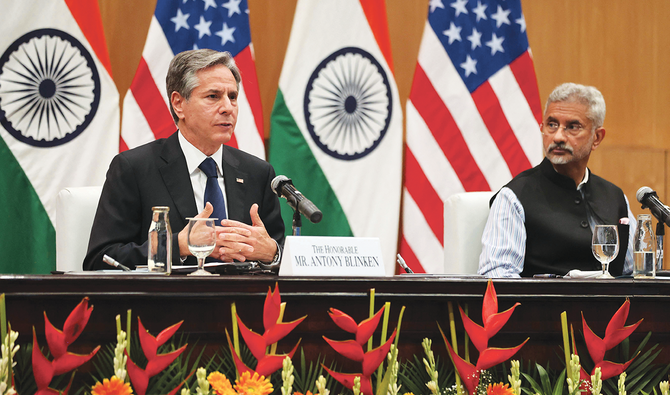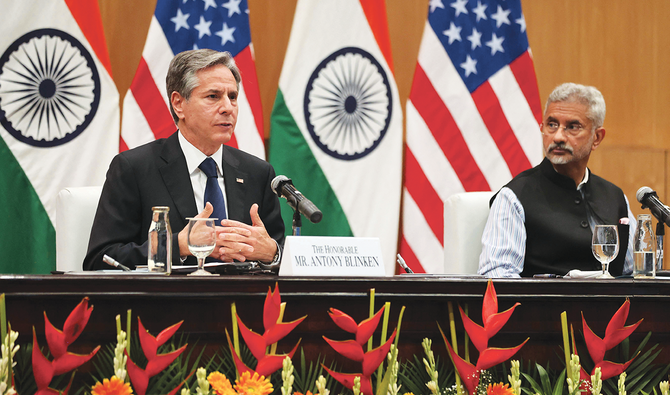NEW DELHI: Growing concerns over China and turmoil in Afghanistan dominated talks between US Secretary of State Antony Blinken and his Indian counterpart Subrahmanyam Jaishankar in New Delhi on Wednesday, with both officials urging the Taliban and Kabul to resolve issues to create a country that is “at peace with itself and its neighbors.”
Jaishankar said in a joint press conference in New Delhi at the end of a two-hour meeting with his US counterpart: “We spoke at length about regional concerns, multilateral institutions and global issues.”
It is Blinken’s first visit to India after assuming charge as US President Joe Biden’s secretary of state.
“Regarding Afghanistan, it is essential that peace negotiations are taken seriously by all parties,” Jaishankar said, adding: “The world wishes to see an independent, sovereign, democratic and stable Afghanistan at peace with itself and with its neighbors.”
Blinken appreciated India’s contributions to Kabul’s development and talked about working together to stabilize the war-ravaged country.
“We discussed regional security scenarios, including Afghanistan,” Blinken said in his opening statement.
“India and the US share a common view on a peaceful, secured and stable Afghanistan. India has made and continues to make vital contributions to Afghanistan’s stability and development,” he added.
New Delhi has spent billions on development projects in Afghanistan in recent years and is a firm backer of the Kabul government.
However, the deteriorating security situation in Afghanistan forced India to evacuate 50 staff from two consulates in the country as the Taliban gained even more territory amid a drawdown of US-led foreign forces.
In April, President Biden ordered the complete withdrawal of about 3,000 US troops from Afghanistan by Sept. 11, effectively ending the US’ longest war.
Earlier this month, Biden gave an updated timeline and said that the US military mission would end by Aug. 31.
Taliban fighters have swept across the country in recent weeks, with the Pentagon admitting on July 21 that half of all district centers — surrounding 17 of Afghanistan’s 34 provincial capitals — were now in the hands of the Taliban.
Blinken said that he disapproved of the Taliban’s “military adventure” as it “does not serve the objective of peace” in Afghanistan.
“Taking over the country by force and abusing the rights of the people is not the path to achieve those objectives. There is only one path, and that is at the negotiation table to resolve the conflict peacefully,” the US official said.
He emphasized that the Taliban’s military advances were “troubling” and that Washington remains engaged in Afghanistan.
“The Taliban is making advances in district centers; there are reports of them committing atrocities in Afghanistan. It’s deeply troubling. It certainly doesn’t speak well about their intentions for the country. We remain engaged in Afghanistan,” he added.
India’s human rights issues was also brought up in discussions, with Blinken holding talks with civil society leaders in Delhi ahead of his meeting with Jaishankar.
“Shared values — freedom and equality — are key, and none of us have done enough. We need to strengthen our democratic institutions. This is at the core of our relationship, beyond strategic and economic ties,” Blinken said.
Since being elected to office in 2014, Prime Minister Narendra Modi and his government have faced allegations of suppressing dissent, pursuing divisive policies to appeal to Hindu voters and enacting the Citizenship Amendment Law two years ago, which Muslims argue is discriminatory.
Debate over India’s human rights record became even more pronounced following the death in custody of 87-year-old Jesuit priest Stan Swamy, who was arrested on charges of supporting ultra-Maoists while awaiting bail.
“One of the elements Americans admire most is a fundamental freedom and human rights. That’s how we define India. India’s democracy is powered by free-thinking citizens,” Blinken said.
The US secretary of state also met a Tibetan delegation in Delhi and ended his short visit to the capital by meeting with Modi.
Both sides also discussed the upcoming meeting in September of the Quad group of countries comprising India, Japan, Australia and the US. The Quad will hold the summit in Washington, which Modi is expected to attend.
Blinken, however, denied that the Quad had been created to counter China’s interests in the Indo-Pacific region following Beijing’s accusations that the “Asian NATO” group was designed to harm China.
The US has long viewed India as a key partner in efforts to overpower China’s economic and military might in the Indo-Pacific region, but Blinken rejected the view that the Quad was a “military alliance.”
He said: “What is Quad? It’s quite simple but important. Its purpose is to advance cooperation on regional challenges while reinforcing international rules and values that we believe together underpin peace, prosperity, and stability in the region.
“We share a vision — India and the US — of a free, open and secure atmosphere in the Indo-Pacific and will work together to make that a reality,” he added.
Foreign policy experts see Blinken’s visit as a “sign of maturity” in India-US ties.
“The press conference was indicative of how the US-India relationship has matured,” Pranay Kotasthane, deputy director of the Takshashila Institution based in the southern Indian city of Bengaluru, told Arab News.
“There was no mention of our western neighbor, and the focus was on regional security, economic recovery and global issues such as climate change,” he added, before noting the convergence between the two countries on the situation in Afghanistan.
“On Afghanistan, both countries seem to agree that a Taliban that forces itself on the people of Afghanistan will face the consequences in terms of international recognition and access, and both the countries feel the need for resolution through the intra-Afghan dialogue,” Kotasthane said.
















